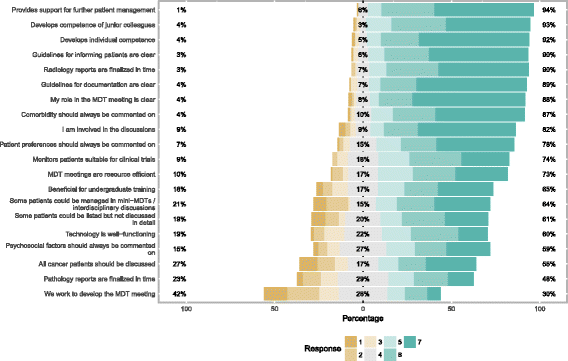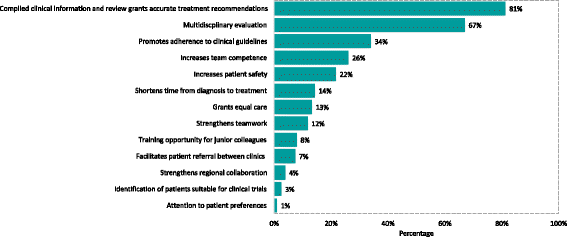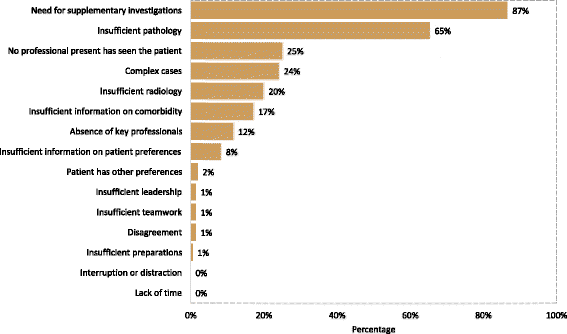Benefits, barriers and opinions on multidisciplinary team meetings: a survey in Swedish cancer care
- PMID: 29622020
- PMCID: PMC5887214
- DOI: 10.1186/s12913-018-2990-4
Benefits, barriers and opinions on multidisciplinary team meetings: a survey in Swedish cancer care
Abstract
Background: Case review and discussion at multidisciplinary team meetings (MDTMs) have evolved into standard practice in cancer care with the aim to provide evidence-based treatment recommendations. As a basis for work to optimize the MDTMs, we investigated participants' views on the meeting function, including perceived benefits and barriers.
Methods: In a cross-sectional study design, 244 health professionals from south Sweden rated MDTM meeting structure and function, benefits from these meetings and barriers to reach a treatment recommendation.
Results: The top-ranked advantages from MDTMs were support for patient management and competence development. Low ratings applied to monitoring patients for clinical trial inclusion and structured work to improve the MDTM. Nurses and cancer care coordinators did less often than physicians report involvement in the case discussions. Major benefits from MDTM were reported to be more accurate treatment recommendations, multidisciplinary evaluation and adherence to clinical guidelines. Major barriers to a joint treatment recommendation were reported to be need for supplementary investigations and insufficient pathology reports.
Conclusions: Health professionals' report multiple benefits from MDTMs, but also define areas for improvement, e.g. access to complete information and clarified roles for the different health professions. The emerging picture suggests that structures for regular MDTM evaluations and increased focus on patient-related perspectives should be developed and implemented.
Keywords: Cross-sectional study; Health care survey; Multidisciplinary team conference; Patient preferences; Tumor board.
Conflict of interest statement
Ethics approval and consent to participate
Ethics approval was obtained from the Regional Ethical Review Board in Lund (reference number: 2016/195). All respondents were informed about the study purposes and gave consent to participate.
Consent for publication
Not applicable.
Competing interests
The authors declare that they have no competing interests.
Publisher’s Note
Springer Nature remains neutral with regard to jurisdictional claims in published maps and institutional affiliations.
Figures



Similar articles
-
Determinants of variable resource use for multidisciplinary team meetings in cancer care.Acta Oncol. 2018 May;57(5):675-680. doi: 10.1080/0284186X.2017.1400682. Epub 2017 Dec 3. Acta Oncol. 2018. PMID: 29199517
-
Process quality of decision-making in multidisciplinary cancer team meetings: a structured observational study.BMC Cancer. 2017 Nov 17;17(1):772. doi: 10.1186/s12885-017-3768-5. BMC Cancer. 2017. PMID: 29149872 Free PMC article.
-
Factors influencing the quality and functioning of oncological multidisciplinary team meetings: results of a systematic review.BMC Health Serv Res. 2022 Jun 27;22(1):829. doi: 10.1186/s12913-022-08112-0. BMC Health Serv Res. 2022. PMID: 35761282 Free PMC article.
-
Health Professionals' Views on Key Enabling Factors and Barriers of National Multidisciplinary Team Meetings in Cancer Care: A Qualitative Study.J Multidiscip Healthc. 2020 Feb 14;13:179-186. doi: 10.2147/JMDH.S240140. eCollection 2020. J Multidiscip Healthc. 2020. PMID: 32103978 Free PMC article.
-
Understanding the effectiveness and quality of virtual cancer multidisciplinary team meetings (MDTMs): a systematic scoping review.BMC Health Serv Res. 2024 Nov 27;24(1):1481. doi: 10.1186/s12913-024-11984-z. BMC Health Serv Res. 2024. PMID: 39605052 Free PMC article.
Cited by
-
Practical Recommendations for Youth Care Professionals to Improve Evaluation and Reflection During Multidisciplinary Team Discussions: An Action Research Project.Int J Integr Care. 2022 Mar 30;22(1):26. doi: 10.5334/ijic.5639. eCollection 2022 Jan-Mar. Int J Integr Care. 2022. PMID: 35431704 Free PMC article.
-
Burnout syndrome and work engagement in nursing staff: a systematic review and meta-analysis.Front Med (Lausanne). 2023 Jul 17;10:1125133. doi: 10.3389/fmed.2023.1125133. eCollection 2023. Front Med (Lausanne). 2023. PMID: 37529242 Free PMC article.
-
Case studies of multi-disciplinary team management of atypical gastric cancer: challenges and lessons learned (about two cases).Pan Afr Med J. 2023 Jun 30;45:113. doi: 10.11604/pamj.2023.45.113.38579. eCollection 2023. Pan Afr Med J. 2023. PMID: 37745919 Free PMC article.
-
Using guideline-based clinical decision support in oncological multidisciplinary team meetings: A prospective, multicenter concordance study.Int J Qual Health Care. 2022 Mar 19;34(1):mzac007. doi: 10.1093/intqhc/mzac007. Int J Qual Health Care. 2022. PMID: 35137091 Free PMC article.
-
Observations of community-based multidisciplinary team meetings in health and social care for older people with long term conditions in England.BMC Health Serv Res. 2022 Jun 8;22(1):758. doi: 10.1186/s12913-022-07971-x. BMC Health Serv Res. 2022. PMID: 35676685 Free PMC article.
References
-
- Pillay B, Wootten AC, Crowe H, Corcoran N, Tran B, Bowden P, et al. The impact of multidisciplinary team meetings on patient assessment, management and outcomes in oncology settings: a systematic review of the literature. Cancer Treat Rev. 2016;42:56–72. doi: 10.1016/j.ctrv.2015.11.007. - DOI - PubMed
-
- Prades J, Remue E, van Hoof E, Borras JM. Is it worth reorganising cancer services on the basis of multidisciplinary teams (MDTs)? A systematic review of the objectives and organisation of MDTs and their impact on patient outcomes. Health policy (Amsterdam, Netherlands) 2015;119(4):464–474. doi: 10.1016/j.healthpol.2014.09.006. - DOI - PubMed
Publication types
MeSH terms
Grants and funding
LinkOut - more resources
Full Text Sources
Other Literature Sources
Research Materials

